For almost 30 years, Damon Locks has been a consummate artist and musician that continues to explore sound and urban visual aesthetics via his personal investigations and working with a wide range of talented individuals. While visitings Locks’ Logan Square studio recently, The COMP Magazine had the opportunity to discuss his long history making music in the city, his various outreach efforts with important nonprofit organizations (e.g., ArtReach, The Center for Urban Pedagogy), the diverse array of persons he has collaborated with, and the new LP, Espiritu Zombi, with the Eternals on New Atlantis Records being released today, followed up with their release party at the Hideout this Saturday!
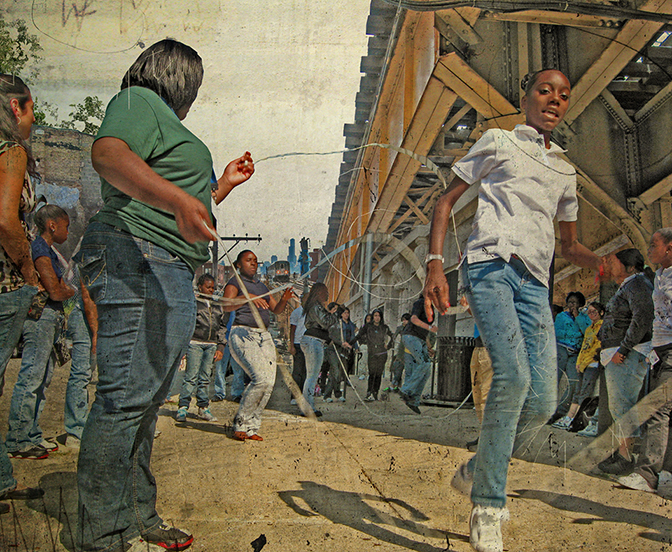
Damon Locks, Street Scene: Girls at Play, 2010
You grew up in the D.C. area, I believe Silver Spring, Maryland? However, you have lived in Chicago for over 25 years. I am wondering if you can share with us what prompted you to make Chicago your home? Are there any early experiences in the city or your youth that inform your present aesthetic practice?
I came to Chicago for school (SAIC). When I arrived my band Trenchmouth formed almost immediately. I started working at the Field Museum of Natural History. All fantastic experiences. I also worked at what was then called The Spertus Institute of Jewish Studies, two different record stores (Blackout and Hi-Fi Records), a record label (Thrill Jockey) and a recording studio called Idful. These things too were unforgettable. Seeing the Sun Ra Arkestra, Bad Brains, Blade Runner, West Side Story, graffiti on walls and buses, everything is part of the continuum.
Being a teenager in the early 80’s and having WDC as my downtown area was pivotal. Being exposed to live music, the WDC hardcore/punk/weirdo scene as well as radio station WHFS and mix tapes from friends and albums purchased from Joe’s Record Paradise and Yesterday and Today, helped form and still informs my current aesthetic greatly (as I type this I am listening to the alternate mix of The Clash’s Combat Rock – “Rat Patrol from Fort Bragg”, 1982). Early on I began to question the status quo as many of the musicians I listened to seemed to.
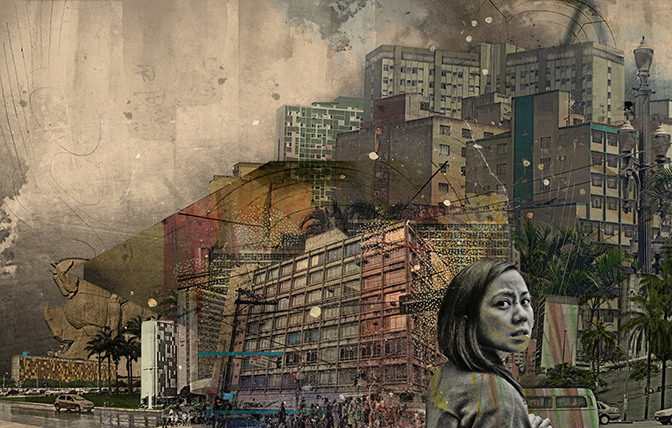
Damon Locks, Alarms, n.d.
You’ve been making music in Chicago since roughly 1988. Lets talk about your various collaborations with Fred Armisen, Wayne Montana, Chris DeZutter, Trenchmouth, and The Eternals. Can you tell us about how your sonic investigations have traversed such an array of genres (e.g., dub, experimental, groove, math rock, post-hardcore, punk) while attempting to produce distinct sound and voice?
I don’t think in terms of genres unless I am in a record store looking to find something. When it comes to making, just make. Trenchmouth (which was Wayne, Fred, Chris, and myself primarily) was exploring music the best way we knew how from the lenses of late teenagers to late 20’s. We made music that reflected what we listened to and what we loved. When Trenchmouth disbanded, Wayne and I continued to explore sound as we still do today in The Eternals. We expand and contract in size and sonics and create projects that consistently challenge ourselves to make music that speaks of our contemporary lives. it grows with us. It can’t help but sound like us because we are doing it. I have also been lucky enough to work with musician Rob Mazurek on several of his projects (Exploding Star Orchestra & Screaming Planet to name two). That taught me a lot about improvisation and immediacy, and using the tools of gained knowledge to express, respond, and move in the real time of creation. In the last year, I have started creating my own sound pieces that answer questions of my own conception. It has been a really wonderful experience and process. Drum machines, boomboxes, samplers, synths, and records all excite the process of doing solo sound pieces. Their tones resonate and signify in as dynamic a way as ink printed on off-white paper for me.
It makes me smile when I consider the diverse roster of musicians you have worked with over the years. This is truly remarkable in a time and place where we are faced with so many ongoing societal injustices (e.g., economic inequality, racial profiling, unlawful police killings) occurring in America. In your creative approach, how do you see these events impacting how you think about and collaborate with such a varied population of artists and musicians?
Oh man. The climate right now as it revolves around: race, the police, incarceration, the justice system, immigration, education, gender violence, LGBTQ rights, the environment, food…it’s all so intensely horrible. It’s hard to process how much hate and ignorance there is in the world. Instead of being overwhelmed (because it can be overwhelming), we have to push past that feeling. It is important for me to work on projects that try to address the issues I think I can effectively impact in some way.
I think about the strength of a project. What would make the project the best? I then seek out people (or they seek me out) to work out the particulars. I think I have always sought to respond in real time to the world around me. I just think I am getting better at it. I have always wanted to make work that resonated with people. I think my first opportunity was with an underground punk scene. When that felt limiting or eventually uneventful, I began to figure out how to stretch beyond that to unknown or undescribed places, regularly in search of ways I could gain more knowledge so my work would be stronger. It is important to me to try to make work that reaches and impacts people, not just the people in the art or music world. I look for opportunities to connect with spaces that are varied to show my work so I know the work can face outward instead of inward. Sometimes it is not about showing work. Sometimes is is about making work for places that need it. Today, my work with the Center for Urban Pedagogy, Prison and Neighborhood Arts Project (at Stateville Correctional Center), or other teaching with ArtReach, has been extremely fulfilling and inspires me to work harder to make work that addresses life as we know it.
Here are a few links to some projects I have worked on with the above mentioned organizations.
CUP: The Center for Urban Pedagogy – http://www.welcometocup.org/Store?product_id=48
CUP: The Center for Urban Pedagogy – http://www.welcometocup.org/Store?product_id=112
I believe the Eternals are set to release a new album in August 2016? Can you share any details? Perhaps, you can provide an introduction to the process in creating this upcoming release?
We will be playing a record release show at The Hideout on 8/13/16. The album is called Espiritu Zombi. The Eternals are traditionally a trio but we expanded to be a 10 piece. We spent a long time working on this record and we are so happy to present this material. It is our most layered, melodic work to date. It was such a wonderful experience stretching our sonic palette. Dealing with so many layers. Fleshing out musical ideas and having additional musicians to expand on them. Working with this group of people was/is educational and puts me through my paces in ways I had not had to in the past.
It was great to work on a record that was so thematic from start to finish. The Espiritu Zombi album is a suite, meant to be heard in a row, in order. It deals with many of the ideas we have talked about in this interview. The apocalypse has happened it just looks different than we expected. It looks like Donald Trump running on a campaign of ignorance, racism and hate. It looks like police killings of black people daily. It looks like the destruction of the planet to make profit. Having to fight off zombies seems less complex because it is obvious who is trying to kill you. In this apocalypse, it is not so simple.
Espiritu Zombi – https://newatlantisrecords.bandcamp.com/album/espiritu-zombi
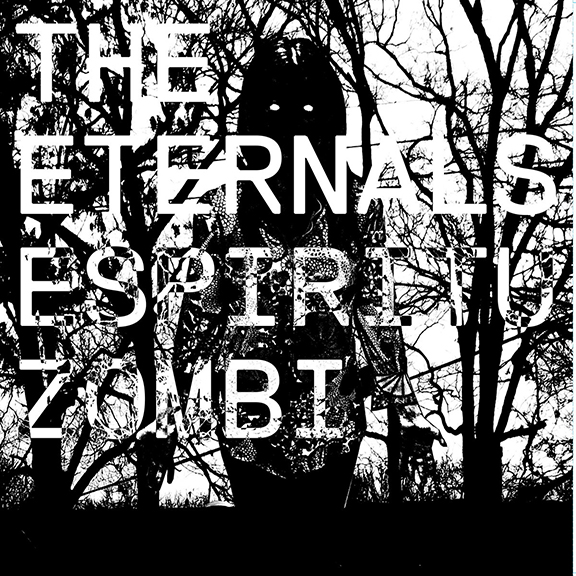
The Eternals, Espiritu Zombi, New Atlantis Records, 2016
Lets backtrack a bit and discuss some of your ongoing visual art pursuits. You studied at the SVA (School of Visual Arts) in New York and SAIC (the School of the Art Institute of Chicago). What role does your visual arts background play in your current artistic explorations?
Art school was useful to get your hands dirty and get to know many different materials and to get into the idea of critiquing your work and other work. I was lucky enough to be in a great art program in junior high through high school called Art Center in Maryland. That started me early hanging out with and exchanging ideas with other artists. That is something that was great about my art school experience as well. There was a long period of time after art school that I didn’t focus on visual art but on music. In that period, I still grew as a visual artist but it was slowly. The last almost decade of focusing on making visual work and music without a day job has been the most effective growth period of my life.
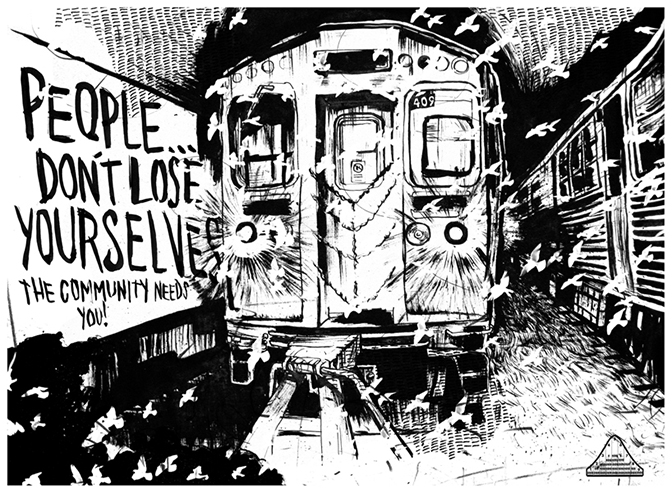
Damon Locks, Don’t Lose Yourself, n.d.
What do you value most in your aesthetic practice?
That is a hard question. I think just being able to do work regularly is what I value most. Just making room to foreground art is invaluable.
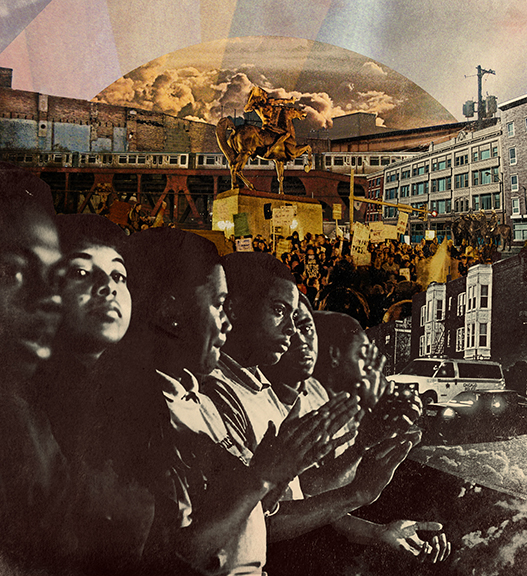
Damon Locks, Manifest Justice, n.d.
What projects or shows are currently in the works? Do you have any specific items that you hope to call closure to and present later this year?
Nothing to promote before the end of the year except The Eternals show and new album. I am gonna be working towards a new body of work for the next year. So, hopefully next year, I will have a lot to present to the public! Keep your eyes peeled.
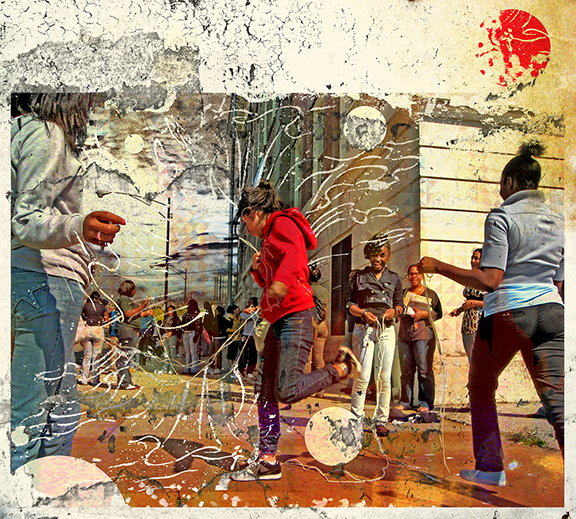
Damon Locks, Street Scene: Other Worlds, 2010
For additional information on the art and music of Damon Locks, please visit:
Damon Locks – http://www.damonlocks.com/art2/
Filmmaker Magazine – http://filmmakermagazine.com/88488-damon-locks-on-new-projects-involving-animation-prison-art-and-the-music-of-sun-ra/#.V62bSJMrKgQ
Trenchmouth – https://en.wikipedia.org/wiki/Trenchmouth
Chicago Artist’s Coalition – http://www.chicagoartistscoalition.org/programs/launch/2016/damon-locks
Newcity Art – http://art.newcity.com/2010/03/22/review-damon-locks-and-eve-finemanheaven-gallery/
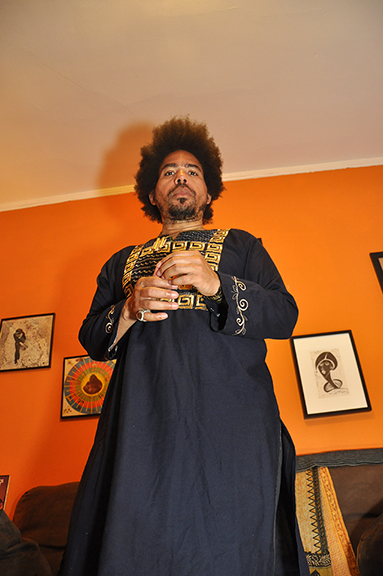
Damon Locks, artist and musician, Chicago, IL, 2016
Artist interview and portrait by Chester Alamo-Costello


